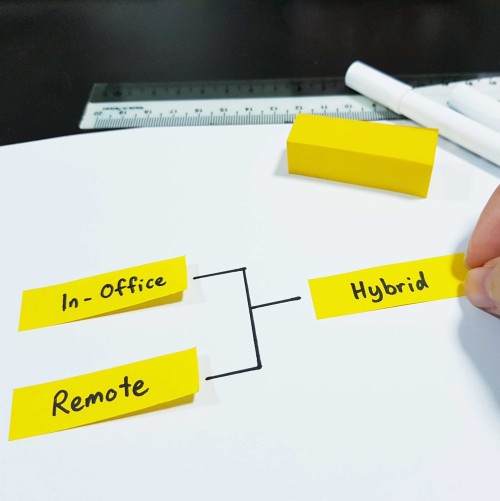
posted 8th May 2025
In the evolving landscape of the IT industry, the choice between remote and hybrid work models has become a pivotal consideration for professionals seeking career growth. The decision is not merely about where you work, but how you work, and how that environment supports your professional ambitions.
Whether you're an IT sales professional or a 3rd line support expert, understanding the nuances of each model can significantly impact your career trajectory. This article delves into the merits and challenges of remote and hybrid work, helping you determine which path aligns best with your career goals in cloud computing, managed services, and cyber security.
Understanding Remote Work in IT
Remote work, once a novel concept, has now become a staple in the IT industry. It offers unparalleled flexibility, allowing professionals to work from the comfort of their homes or any location of their choice. This model is particularly appealing in roles such as cloud computing jobs and cyber security positions, where the primary requirement is a stable internet connection and a secure digital workspace. The rise of digital tools and platforms has further accelerated the adoption of remote work, making it an integral part of the modern IT landscape.
Remote work also caters to a global workforce, breaking down geographical barriers that once limited job opportunities. IT professionals can now collaborate with colleagues and clients across the world, bringing diverse perspectives to problem-solving and innovation. This global reach can lead to more diverse and enriching career experiences, fostering a broader understanding of the industry.

Advantages of Remote Work
1. Enhanced Work-Life Balance: Remote work can offer a better work-life balance, a critical factor for many IT professionals. The absence of commuting allows for more personal time, which can be spent on personal development or leisure activities. This flexibility is particularly beneficial for those with family commitments or those pursuing further education, allowing them to tailor their work schedules around their personal lives.
2. Geographical Flexibility: IT professionals are not bound by location, opening up opportunities to work with companies globally without the need to relocate. This is especially beneficial for niche roles in managed service providers. Moreover, the ability to choose one's location can lead to a reduction in living costs and an improvement in quality of life, as professionals can reside in regions that better suit their lifestyle preferences.

3. Increased Productivity: Many find that working remotely reduces office distractions, leading to increased productivity and focus on complex tasks. Additionally, remote work allows individuals to create an environment that suits their personal productivity style, whether that involves a quiet home office or the ambient noise of a coffee shop.
Challenges of Remote Work
However, remote work is not without its challenges. It requires a high degree of self-discipline and can sometimes lead to feelings of isolation. The absence of a physical office space can blur the lines between work and personal life, making it difficult to switch off and leading to potential burnout. The lack of direct interaction with colleagues might hinder collaboration and team bonding, which are crucial in IT sales roles.
Furthermore, remote work can present technological challenges, such as unreliable internet connections or inadequate home office setups. These issues can impede productivity and create frustration if not addressed. Additionally, remote workers may miss out on spontaneous brainstorming sessions or impromptu discussions that often lead to innovation and creativity within a traditional office setting.
Exploring Hybrid Work in IT
The hybrid work model combines the best of both worlds, offering flexibility while maintaining some level of in-office interaction. This model can be particularly advantageous for roles that benefit from face-to-face collaboration, such as IT sales professionals who thrive on interpersonal interactions. Hybrid work allows organisations to retain the benefits of remote work while addressing some of its shortcomings, creating a more balanced work environment.
Hybrid work models can also support company culture by fostering a sense of community and belonging. Regular in-office interactions can help build stronger relationships among team members, enhancing trust and collaboration. This blend of remote and in-office work can lead to a more engaged and motivated workforce, driving better business outcomes.
Advantages of Hybrid Work
1. Balanced Interaction: Hybrid work provides a balance between remote flexibility and in-person collaboration, fostering a more dynamic and interactive work environment. This model supports diverse working styles, accommodating those who prefer remote work as well as those who thrive in social settings. The flexibility to choose when and where to work can lead to greater job satisfaction and reduced stress levels.
2. Improved Collaboration: Regular in-office days can enhance teamwork and communication, which is particularly beneficial in managed service provider roles where cross-functional team collaboration is critical. Face-to-face interactions can lead to faster decision-making and more effective problem-solving, as team members can communicate more freely and clearly.

3. Access to Resources: Being in the office occasionally allows IT professionals to access on-site resources and tools that might not be available remotely, thus enhancing their work quality and efficiency. This access can include specialised equipment, secure networks, or administrative support, which can be crucial for certain tasks and projects.
Challenges of Hybrid Work
The hybrid model can pose challenges, such as the need to commute on certain days, which can disrupt the work-life balance that remote work offers. Commuting can be time-consuming and costly, potentially negating some of the benefits of flexible work arrangements. Additionally, the inconsistency between remote and office days may lead to logistical challenges in scheduling and project management, requiring careful planning and coordination.

Making the Right Choice for Your IT Career
When deciding between remote and hybrid work models, consider your personal and professional priorities. For IT sales professionals, the choice might hinge on the need for personal interaction and the desire for a dynamic work environment. Conversely, 3rd line support professionals might prefer the uninterrupted focus that remote work can provide. The decision is inherently personal and should align with both your career objectives and lifestyle preferences.
Factors to Consider
- Career Goals: If your goal is to advance in cloud computing jobs or cyber security, remote work may offer the undisturbed environment necessary for deep technical work and skill development. Consider how each work model supports your long-term ambitions and professional growth.
- Personal Preferences: Reflect on whether you thrive in a solitary environment or if regular face-to-face interactions energise you and enhance your performance. Understanding your own work style can guide you toward a model that maximises your productivity and satisfaction.
- Company Culture: Evaluate the company's culture and support for remote or hybrid work. A supportive infrastructure is crucial for success in either model. Research how organisations implement these models and choose a workplace that aligns with your values and expectations.
- Skill Set: Consider the nature of your role. If your job involves high levels of collaboration, a hybrid model might be more suitable. Conversely, if your role requires deep concentration and minimal distractions, remote work could be more advantageous.
The Future of Work in IT
The IT industry is rapidly evolving, and with it, the future of work. Both remote and hybrid models are likely to coexist, offering professionals a spectrum of choices. Companies are increasingly recognising the benefits of both models and are investing in infrastructure to support them. As technology continues to advance, new opportunities for flexible work arrangements will emerge, further transforming the workplace.
Embracing Flexibility
The key is flexibility. As an IT professional, being adaptable to different work environments will be an asset. Whether in cloud computing, managed services, or cyber security, the ability to work effectively in both remote and hybrid settings will enhance your career prospects. Embracing flexibility will not only open up new opportunities but also prepare you for the inevitable changes in the industry.

Building Skills for Remote and Hybrid Work
- Technical Proficiency: Ensure you are proficient with digital tools and platforms that facilitate remote work. Familiarity with collaboration tools like Slack, Zoom, and project management software is essential. Staying up-to-date with the latest technologies will keep you competitive in the job market.
- Communication Skills: Hone your ability to communicate clearly and effectively in both written and verbal formats. This is crucial in maintaining team cohesion and ensuring project success in both work models. Effective communication is the cornerstone of successful remote and hybrid work, bridging the gap between team members.
- Time Management: Mastering time management is vital for remote work success, where self-discipline plays a significant role in productivity. Developing strong organisational skills and prioritising tasks effectively will enable you to manage your workload efficiently, regardless of your work environment.

Conclusion
Choosing between remote and hybrid work models is a deeply personal decision that can shape your IT career trajectory. By weighing the advantages and challenges of each, and considering your career goals, personal preferences, and the nature of your role, you can make an informed decision that propels your career forward.
Embrace the flexibility that the IT industry offers, and position yourself for success in the ever-evolving work landscape. The future of work is versatile and dynamic, and by aligning your career path with these trends, you can achieve both professional fulfilment and personal satisfaction.
If you are currently seeking a new role or are looking to hire in Cloud, Cyber Security, or Managed Service spaces, please get in touch to learn how we can help you.
You can get in contact with us by emailing contact@tsrltd.co.uk or calling 020 3837 9180. We look forward to working with you!




